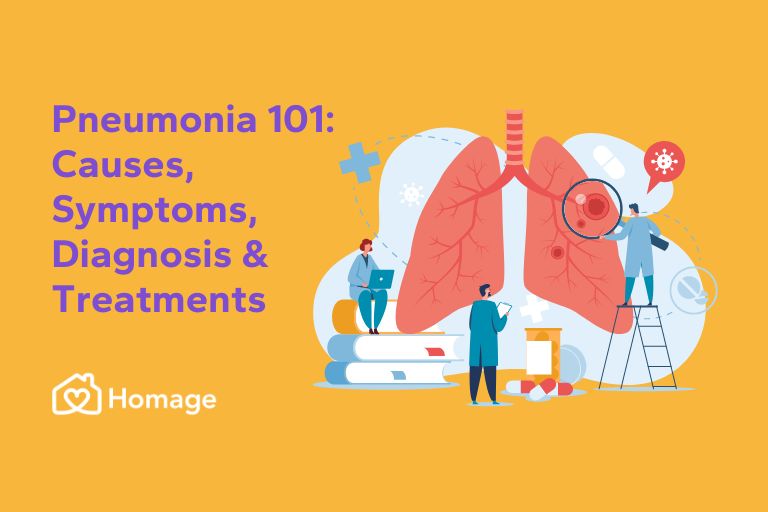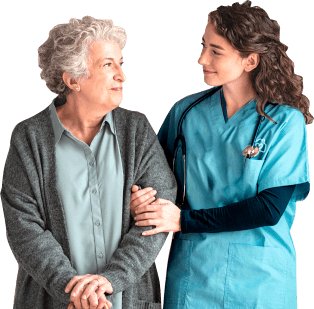What is pneumonia?
 Pneumonia is an infection of the lungs. There are many variants and causes of pneumonia, but most are caused by bacteria and viruses. Pneumonia often is triggered by another benign cold or flu, in which symptoms get worse as someone would usually be recovering. Pneumonia occurs when the air sacs responsible for gas exchange in the body – the alveoli – become dangerously inflamed, impeding adequate oxygen exchange into the body. This inflammation obstructs the oxygen flow into the body.
Pneumonia is an infection of the lungs. There are many variants and causes of pneumonia, but most are caused by bacteria and viruses. Pneumonia often is triggered by another benign cold or flu, in which symptoms get worse as someone would usually be recovering. Pneumonia occurs when the air sacs responsible for gas exchange in the body – the alveoli – become dangerously inflamed, impeding adequate oxygen exchange into the body. This inflammation obstructs the oxygen flow into the body.
Babies, children, the elderly, and those with chronic illness are most susceptible to major harm from pneumonia. Many types of pneumonia are benign and will be resolved with medical treatment, but some types can be fatal. The aforementioned age groups are at risk of fatality from pneumonia, as well as Indigenous Australians and those with existing chronic illnesses. Pneumonia acquired in a hospital is a specific risk for older Australians, who are usually admitted for a separate medical issue and end up acquiring the bug. It’s important to know the signs and symptoms for when to get help, as well as know how to protect yourself and your family against the illness.
Types of pneumonia
Bacterial pneumonia
Bacterial pneumonia is caused by varying kinds of bacteria that infect the alveoli. The most common cause of this type of pneumonia is streptococcus pneumoniae, which can be fatal. streptococcus pneumoniae is a bacteria that is found in the mouth and throat of around 70% of the population and is usually benign. However, if the infection reaches the lungs, this is cause for concern in vulnerable populations.
Viral pneumonia
Viral pneumonia is typically less serious than bacterial pneumonia and usually occurs after infection with another virus, such as a cold or flu. This type of pneumonia accounts for about a third of all pneumonia infections. This type of pneumonia is contagious.
Mycoplasma pneumonia
Mycoplasma is another kind of atypical bacteria pneumonia. This is usually less severe than streptococcus pneumoniae.
Fungal pneumonia
Fungal pneumonia is much more atypical than other kinds of pneumonia. This is a rare form of pneumonia and occurs when someone breathes in fungal spores that may be present in certain soils, animal droppings, or clinical environments. This is not contagious but can be serious.
Signs and symptoms of pneumonia
 It can be easy to miss the signs of pneumonia as they can typically present like a normal cold, flu, or respiratory illness. The key is that if symptoms exceed the expected time frame of a cold or flu or worsen drastically after a few days, this may indicate pneumonia. Symptoms can include:
It can be easy to miss the signs of pneumonia as they can typically present like a normal cold, flu, or respiratory illness. The key is that if symptoms exceed the expected time frame of a cold or flu or worsen drastically after a few days, this may indicate pneumonia. Symptoms can include:
- General feelings of illness, such as fever, lethargy, chills, and muscle aches
- Chest pain when breathing, coughing, or exercising
- Coughing, which may be dry or produce phlegm
- A fever (but in older people, this may translate to a lower body temperature)
- Nausea, vomiting, and diarrhea
- Shortness of breath
- Cool extremities
- Confusion or changes in mental state (for older Australians).
Risk factors of pneumonia
You are more likely to become ill with pneumonia if you have a pre-existing condition that affects your lungs or an issue that weakens your immune system. This means your lungs and immunity, in general, are less effective at fighting disease. There are other factors and pre-existing conditions that increase your chance of obtaining pneumonia, which include:
Demographic groups
Babies and Young Children under 2
Babies and young children are disproportionately at risk from pneumonia because their immune systems are more underdeveloped and they are less likely to naturally fight off the virus, as healthy adults can. In their early years of life, they are more likely to pick up viruses and bugs that are unfamiliar to their immune system, too.
Adults over 75
 As we age, our immune system generally declines, as does our respiratory function. We are likely to have more co-morbid illnesses as we age, too. This means our immune system is more susceptible to disease and also less likely to fight it off naturally. Lots of older Australians also live with Chronic Obstructive Pulmonary Disorder (COPD), which further complicates our respiratory system’s ability to naturally fight off respiratory disorders.
As we age, our immune system generally declines, as does our respiratory function. We are likely to have more co-morbid illnesses as we age, too. This means our immune system is more susceptible to disease and also less likely to fight it off naturally. Lots of older Australians also live with Chronic Obstructive Pulmonary Disorder (COPD), which further complicates our respiratory system’s ability to naturally fight off respiratory disorders.
Thankfully, vaccines for these two age groups are free and encouraged in Australia.
Pre-existing conditions
Immune-worsening
immune-worsening illnesses like HIV/AIDS, Type II diabetes, or autoimmune conditions. These kinds of conditions naturally decrease our immune system to any kind of bacteria or infection, and pneumonia is no different – people with these illnesses are more susceptible to pick up respiratory infections.
People who are taking immunosuppressants
people who are taking immunosuppressants for conditions like cancer or autoimmune conditions. These kinds of treatments suppress the immune system so that the disease can be suppressed, but often weakens our naturally ability to fight off germs or viruses like pneumonia.
People who have issues with swallowing or have eating difficulties
People who have issues with swallowing or have eating difficulties, which increases the risk of aspirating food into the airways (people with cognitive impairments, dementia, etc). This is because having foreign bodies enter the airway and lungs is a risk-factor for pneumonia, as even small particles caught in the lungs can lead to nasty bacterial growth and subsequent infection.
Lifestyle factors
People who smoke tobacco
Tobacco smoking not only reduces lung function and respiratory function, but also decreases our general immune function as the tobacco smoke and chemicals interrupts the cellular functions that are responsible for keeping our white blood cells healthy and functioning. This means tobacco smokers are more likely to pick up the virus, as well as less likely to be able to fight it off.
Poor nutrition and lifestyle
Keeping a healthy lifestyle by staying active, eating well, and sleeping well, are all important factors in maintaining a good immune system. Good nutrition is especially paramount in fighting off infection – getting enough vitamins, minerals, and calories is key to preventing and also fighting off infection. People who do not have good nutrition intake are susceptible to more viruses, as well as have poorer outcomes for recovering – pneumonia included.
Circumstantial factors
People who are being treated in hospitals
People who are being treated in hospitals have a greater risk of acquiring pneumonia due to the superbugs that are present in hospitals. If equipment is being used to help someone breathe, then their chance of acquiring pneumonia increases again due to the risk of germs on such equipment.
Diagnosing pneumonia
A doctor will diagnose pneumonia by taking a history of the person’s symptoms and medical history and examining them for signs of the illness.
Pinpointing exactly what type of pneumonia it is will be done by taking blood samples, swabbing inside the nose or throat, or taking a sputum sample. This will dictate the kind of treatment that will need to be administered. A chest X-ray may be completed to see the level of impact on the lungs. If pneumonia has been acquired in the hospital, vital signs such as oxygen saturation will also consistently be checked.
Treatment of pneumonia will depend on whether the pneumonia is caused by bacteria or a virus and also whether someone is being treated in a hospital or via a community healthcare team. Viral pneumonia will usually self-resolve with plenty of rest, fluids, and simple pain relief. Cough medicine is not indicated for pneumonia. Bacterial pneumonia will require antibiotics, which can be taken orally and at home if the case is mild but may require hospitalisation and intravenous antibiotics if the case is severe. These groups may also require oxygen treatment to maintain adequate oxygen levels in the blood. If you are part of an age group at high risk of fatality from pneumonia, you will likely be hospitalised to receive assertive treatment.
Prevention of pneumonia
Remembering to keep a healthy lifestyle and thus a healthy immune system is important to protecting yourself against pneumonia. For older Australians, it’s especially important to keep mobile and moving – this helps the natural removal of germs from our lungs during the day-to-day so that pneumonia doesn’t have a chance to develop. Quitting smoking is also an amazing way to build lung health and prevent disease.
There are vaccinations against certain types of pneumonia, too – specifically against the bacteria pneumococcal. This is part of a normal vaccination program for babies and young children, and is free for Australians over 70. This enables your body to build immunity against pneumococcal and reduce your risk of becoming ill with the most fatal strain of pneumonia.
When to get emergency care
If you or a loved one is struggling to breathe and has signs of cyanosis (lack of oxygen) such as blue face or extremities, you must call 000 to get emergency care.
How Homage can support people with pneumonia
Homage has a dedicated team of health professionals, including Registered Nurses and support workers, to help you with innumerable steps during your experience with pneumonia. These team members can help you with transport to medical appointments for GP checkups, help you access vaccination, or accompany you to exercise to keep your physical health in order to further minimise the risks of contracting pneumonia. They can also help with tasks around the home or personal care activities if you are recovering from pneumonia and find your energy isn’t quite what it used to be. Otherwise, our staff are available to simply provide accompaniment and companionship at home during the difficult recovery time.
Provide the best care to your loved one today!
- Australia, Healthdirect. “Pneumonia.” Www.healthdirect.gov.au, 2 Aug. 2022, www.healthdirect.gov.au/pneumonia#prevented. Accessed 3 Nov. 2022.
- Health. “Pneumococcal Immunisation Service.” Australian Government Department of Health and Aged Care, 26 May 2020, www.health.gov.au/health-topics/immunisation/vaccines/pneumococcal-immunisation-service.
- Health, St Vincent’s Heart. “St Vincent’s Heart Health.” Www.svhlunghealth.com.au, 2022, www.svhlunghealth.com.au/conditions/pneumonia.
- Mayo Clinic. “Pneumonia.” Mayo Clinic, 2018, www.mayoclinic.org/diseases-conditions/pneumonia/symptoms-causes/syc-20354204











